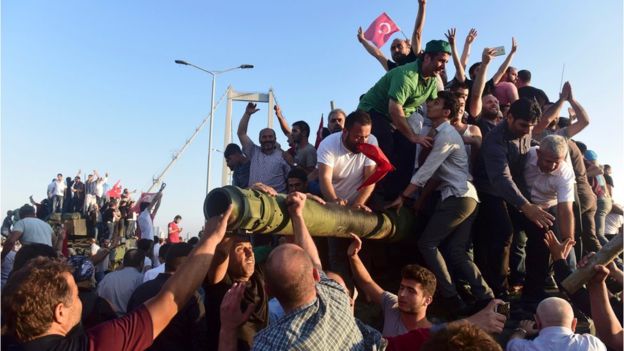
BBC Online: Some 2,839 soldiers, including high-ranking officers, have been arrested over an attempted coup that is now over, says Turkey’s PM Binali Yildirim.
In a night he called a “black stain on Turkish democracy”, he said 161 people had been killed and 1,440 wounded.
Explosions and gunfire were heard in Ankara, Istanbul and elsewhere overnight and thousands of Turks heeded President Erdogan’s call to rise up against the coup-plotters.
It is not clear who is behind the coup.
President Recep Tayyip Erdogan blamed a “parallel structure”, in a clear reference to Fethullah Gulen, a powerful but reclusive US-based Muslim cleric he accuses of fomenting unrest.
However, in a statement, Mr Gulen rejected any suggestion he had links to the events, saying he condemned “in the strongest terms, the attempted military coup in Turkey”.
The attempted coup happened because Turkey is deeply divided over President Erdogan’s project to transform the country and because of the contagion of violence from the war in Syria.
President Erdogan and his AK Party have become experts at winning elections, but there have always been doubts about his long-term commitment to democracy. He is a political Islamist who has rejected modern Turkey’s secular heritage. Mr Erdogan has become increasingly authoritarian and is trying to turn himself into a strong executive president.
From the beginning Mr Erdogan’s government has been deeply involved in the war in Syria, backing Islamist opposition to President Assad. But violence has spread across the border, helping to reignite the fight with the Kurdish PKK, and making Turkey a target for the jihadists who call themselves Islamic State.
That has caused a lot of disquiet. Turkey has faced increasing turmoil and the attempt to overthrow President Erdogan will not be the last of it.
Events began on Friday evening when tanks took up positions on two bridges over the Bosphorus Strait in Istanbul, blocking it to traffic. Troops were seen on the streets and low-flying military jets were filmed over Ankara.
Shortly after, a faction of the army released a statement saying that a “peace council” was running the country, and it had launched the coup “to ensure and restore constitutional order, democracy, human rights and freedoms”.
President Erdogan was in the south-west holiday resort of Marmaris at the time. He made a televised address, via his mobile phone, urging people to take to the streets to oppose the uprising.
He then flew on to Istanbul, saying Marmaris had been bombed after he left.
In a speech at Istanbul airport, Mr Erdogan said: “What is being perpetrated is a treason and a rebellion. They will pay a heavy price.”

The Turkish parliament and presidential buildings in Ankara were attacked. At least one bomb hit the parliament complex. MPs were believed to be hiding in shelters.
Gunfire was also heard outside Istanbul police headquarters and tanks were said to be stationed outside Istanbul airport.
Broadcaster CNN Turk was temporarily taken off air after soldiers entered the building and tried to take it over. CNN Turk later tweeted a photo of soldiers being arrested by police.
Mike Baddeley, on holiday in Marmaris, said he was woken by “a very large explosion, followed by, it seemed like one or two helicopters flying above our heads… with machine gun fire”.
In the morning, he saw armed men in military fatigues walking around the hotel, but no further violence.
There were reports of fierce clashes in Taksim Square in the centre of Istanbul, and gunfire and explosions were heard near the square.
One of the helicopters being flown by rebels was shot down by government troops in Ankara.
Sporadic gunfire was still being reported in some areas by morning.
Prime Minister Yildirim said the situation was now “completely under control” and the government’s commanders were now back in charge.
Earlier, the acting military chief of staff Umit Dundar said officers from the air force, the military police and armoured units had been mainly involved in the coup attempt.
He said that although the chief of staff had been rescued, several military commanders were still being held hostage.
Greek police say a Turkish military helicopter landed in the north of Greece on Saturday with eight men seeking asylum. Most were in military uniform and were believed to have been involved in the coup attempt, Greek TV reported.
Earlier, some 200 unarmed soldiers left Turkey’s military headquarters in Ankara and surrendered to police, according to the state-run Anadolu news agency.
Dramatic images showed dozens of soldiers walking away from their tanks with their hands up on one of Istanbul’s Bosphorus bridges.

